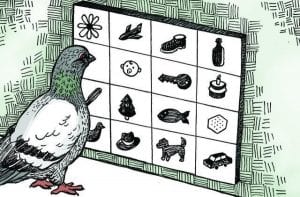
by Pigeon Patrol | Aug 2, 2016 | Pigeon Patrol's Services, Pigeons in the News, UltraSonic Bird Control
 Humans could become better at switching between tasks – such as shifting from emailing to taking a phone call – if they behaved more like pigeons and stopped thinking about what they are doing, research by psychologists at the University of Exeter suggests.
Humans could become better at switching between tasks – such as shifting from emailing to taking a phone call – if they behaved more like pigeons and stopped thinking about what they are doing, research by psychologists at the University of Exeter suggests.
In an experiment that compared humans’ ability to switch between tasks with that of pigeons, the researchers found that while the birds’ way of learning to do tasks associatively caused no decrease in accuracy, humans incurred costs, in that they were slower and made more mistakes when they stopped doing one thing and started doing another.
The work of PhD student Christina Meier and Professors Stephen Lea and Ian McLaren, which was published in the Journal of Experimental Psychology: Animal Learning and Cognition, has been highlighted in the American Psychological Association’s series of ‘Particularly Exciting Experiments in Psychology’ (known as “PeePs”) this week (June 9).
A large body of research has shown that people are faster and more accurate when they repeat the same task than when they switch between tasks. This experiment showed that pigeons who learnt a task associatively by means of Pavlovian conditioning were able to switch between tasks without slowing down or making more errors.
Lead author Christina Meier said: “We looked at why humans make more errors when they move between two different tasks whereas pigeons don’t. Pigeons don’t analyse what they see. If they experienced a given situation before, the pigeons will repeat the behaviour that had the best outcome for them in those previous encounters. Humans don’t do this, we use rules. We make things complicated.”
Professor McLaren said: “We are not saying that pigeons are super clever. What this research shows is that we can teach pigeons to swap between tasks at no cost to their efficiency, and that they appear to be doing it without what psychologists call “executive control”. We suspect humans have access to this associative solution to the problem too and this has educational implications, skills implications and implications for our understanding of human behaviour.”
About Pigeon Patrol:
Pigeon Patrol Products & Services is the leading manufacturer and distributor of bird deterrent (control) products in Canada. Pigeon Patrol products have solved pest bird problems in industrial, commercial, and residential settings since 2000, by using safe and humane bird deterrents with only bird and animal friendly solutions. At Pigeon Patrol, we manufacture and offer a variety of bird deterrents, ranging from Ultra-flex Bird Spikes with UV protection, Bird Netting, 4-S Gel and the best Ultrasonic and audible sound devices on the market today.
Voted Best Canadian wholesaler for Bird Deterrent products four years in a row.
Contact Info: 1- 877– 4– NO-BIRD (www.pigeonpatrol.ca)
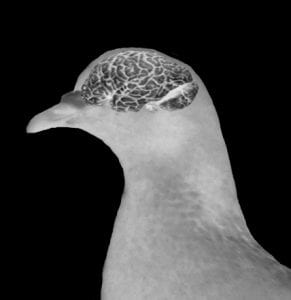
by Pigeon Patrol | Aug 1, 2016 | Pigeon Patrol's Services, Pigeons in the News, UltraSonic Bird Control
 Humans could be more efficient if they learnt from pigeons and stopped thinking about what they are doing, according to scientists.
Humans could be more efficient if they learnt from pigeons and stopped thinking about what they are doing, according to scientists.
Switching between making a phone call and writing an email led to more mistakes as humans stopped doing one thing and started another.
Scientists at the University of Exeter carried out research to compare a human’s ability to switch between tasks with that of pigeons.
They found that while the birds’ way of learning to do tasks associatively caused no decrease in accuracy, humans incurred costs – in that they were slower and made more mistakes when they switched tasks.
Previous studies have shown that people are faster and more accurate when they repeat the same task than when they do something different.
The work of PhD student Christina Meier and professors Stephen Lea and Ian McLaren revealed that pigeons who learnt a task associatively by means of Pavlovian conditioning were able to switch between tasks without slowing down or making more errors.
Ms Meier, the lead author, said: “We looked at why humans make more errors when they move between two different tasks whereas pigeons don’t. Pigeons don’t analyse what they see.
“If they experienced a given situation before, the pigeons will repeat the behaviour that had the best outcome for them in those previous encounters. Humans don’t do this, we use rules. We make things complicated.”
Prof McLaren said: “We are not saying that pigeons are super clever. What this research shows is that we can teach pigeons to swap between tasks at no cost to their efficiency, and that they appear to be doing it without what psychologists call ‘executive control’.
“We suspect humans have access to this associative solution to the problem too and this has educational implications, skills implications and implications for our understanding of human behaviour.”
The study, Task-Switching in Pigeons: Associative Learning or Executive Control?, is published in the Journal of Experimental Psychology: Animal Learning and Cognition.
About Pigeon Patrol:
Pigeon Patrol Products & Services is the leading manufacturer and distributor of bird deterrent (control) products in Canada. Pigeon Patrol products have solved pest bird problems in industrial, commercial, and residential settings since 2000, by using safe and humane bird deterrents with only bird and animal friendly solutions. At Pigeon Patrol, we manufacture and offer a variety of bird deterrents, ranging from Ultra-flex Bird Spikes with UV protection, Bird Netting, 4-S Gel and the best Ultrasonic and audible sound devices on the market today.
Voted Best Canadian wholesaler for Bird Deterrent products four years in a row.
Contact Info: 1- 877– 4– NO-BIRD (www.pigeonpatrol.ca)

by Pigeon Patrol | Jul 30, 2016 | Bird Deterrent Products, Pigeon Patrol's Services, Pigeons in the News
 A lonely woman who ignored a council order to stop feeding the pigeons in her garden must pay a £640 fine and £1,729 court costs.
A lonely woman who ignored a council order to stop feeding the pigeons in her garden must pay a £640 fine and £1,729 court costs.
Katherine Spiller, 66, said the birds were “a bit of company”, but attracted so many that neighbours complained.
Spiller, from Oxford, admitted breaking a community protection order.
The lonely woman fed pigeons in her garden for 20 years so that they could keep her company.
Pensioner Katherine Spiller began inviting the birds into her garden in 1995 by throwing seed from her bathroom window.
The 66-year-old attracted large flocks of pigeons – which are recognised as a pest in the UK – as well as smaller garden birds to keep her company.
However, over the past two decades the former librarian and administrator has amassed complaints from fed-up neighbours who can’t stand the birds which defecate on their property and dominate the garden walls like a scene from an Alfred Hitchcock movie.
Spiller has also caused a flap among shoppers in Oxford city centre where she has also been spreading the seed.
As a result, dozens of pigeons would descend daily onto the street near picturesque and historic Magdalen College as well as other locations across the city.
Following a growing number of complaints, Oxford City Council stepped in 12 months ago and ordered her to stop.
Despite this, the “habitual bird feeder” was put before magistrates again after ignoring the order between August and October last year.
Magistrates in Oxford were shown dozens of pictures of the birds sitting on the roof and ledges of Spiller’s terraced house as well as sitting on her neighbours buildings.
Jeremy Franklin, representing Oxford City Council, told magistrates that neighbours had reported her continuing to put out bird seed.
Mr Franklin added: “The defendant is an habitual feeder of birds, mostly pigeons, which congregate around her house in large numbers, causing a certain amount of distress and antagonism to the neighbours.
“The warning notice required the defendant to cease dropping bird seed or foodstuffs that would encourage birds, vermin or other animals in her garden or anywhere and to keep her garden free from weeds and plants providing shelter to vermin and other animals.
“Despite the imposition of the notice, the defendant was found to have breached it by continuing to feed the pigeons.”
Mr Franklin said the city council might have to take further action to stop Spiller from feeding the pigeons unless she could change her habits.
He added: “Those charged with dealing with this problem are at their wits end.”
A spokesman for Oxford City Council said after the hearing that neighbours were unable to use their gardens in the summer months because of the birds perching and defecating in the gardens. He added that a nuisance was being caused by bird flying into windows.
Spiller had sent a letter to the court, admitting she had failed to comply with a community protection notice and the court clerk revealed it was “very, very rambling” and mainly consisted of “poems that have been written by Ms Spiller”.
The panel of magistrates handed Spiller, who did not attend the hearing, a fine of £640 for breaching the community protection order handed out in February last year. She was also ordered to pay a £64 victim surcharge and £1,729 prosecution costs.
Speaking from her home, the keen poet said: “The birds like being fed but now you can’t feed them in town. You can’t even feed the ducks.
“There was not the same law in place at the time when I first began feeding them in 1995. I think it is a wicked law and it makes it hard on the pigeons.
“They could be an amenity for people who lack a bit of company. I don’t have a partner or children so the pigeons were my only company, and people do look for company in the pigeons.”
Spiller, who wrote a poem in 1997 entitled Pigeon Woman which reflects on her own experiences of feeding the birds, added that she would remain hopeful for the future that the law on feeding the pigeons would change.
About Pigeon Patrol:
Pigeon Patrol Products & Services is the leading manufacturer and distributor of bird deterrent (control) products in Canada. Pigeon Patrol products have solved pest bird problems in industrial, commercial, and residential settings since 2000, by using safe and humane bird deterrents with only bird and animal friendly solutions. At Pigeon Patrol, we manufacture and offer a variety of bird deterrents, ranging from Ultra-flex Bird Spikes with UV protection, Bird Netting, 4-S Gel and the best Ultrasonic and audible sound devices on the market today.
Voted Best Canadian wholesaler for Bird Deterrent products four years in a row.
Contact Info: 1- 877– 4– NO-BIRD (www.pigeonpatrol.ca)
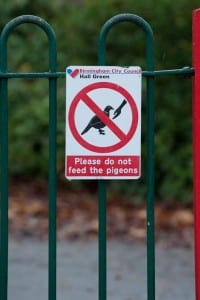
by Pigeon Patrol | Jul 28, 2016 | Bird Deterrent Products, Pigeon Patrol's Services, Pigeons in the News
 FEEDING the birds costs “tuppence a bag” in the classic film Mary Poppins, but one woman has been fined £640 for putting out food for the pigeons.
FEEDING the birds costs “tuppence a bag” in the classic film Mary Poppins, but one woman has been fined £640 for putting out food for the pigeons.
Katherine Spiller was handed a community protection notice by Oxford City Council in February last year after neighbours complained about the large numbers of pigeons congregating around her home.
But the “habitual bird feeder” failed to abide by the notice and continued to put seed out in her garden in Temple Street, east Oxford, a court heard.
Magistrates were shown pictures of dozens of pigeons perched on the roof and window ledges of the terraced house, and even sitting on neighbouring buildings.
Jeremy Franklin, representing Oxford City Council, said 66-year-old Spiller flouted the notice eight times between August and October last year.
He told Oxford Magistrates’ Court on Monday how neighbours reported Spiller to the council for continuing to put out bird seed.
Mr Franklin added: “The defendant is an habitual feeder of birds, mostly pigeons, which congregate around her house in large numbers, causing a certain amount of distress and antagonism to the neighbours.
“The warning notice required the defendant to cease dropping bird seed or foodstuffs that would encourage birds, vermin or other animals in her garden or anywhere and to keep her garden free from weeds and plants providing shelter to vermin and other animals.
“Despite the imposition of the notice, the defendant was found to have breached it by continuing to feed the pigeons.”
Mr Franklin said the city council might have to take further action to stop Spiller from feeding the pigeons unless she could change her habits.
He added: “Those charged with dealing with this problem are at their wits end.”
The court heard Spiller had sent a letter to the court, admitting she had failed to comply with a community protection notice.
But the court clerk said the letter was “very, very rambling” and mainly consisted of “poems that have been written by Ms Spiller”.
The panel of magistrates handed Spiller – who did not attend the hearing – a fine of £640 for breaching the order.
About Pigeon Patrol:
Pigeon Patrol Products & Services is the leading manufacturer and distributor of bird deterrent (control) products in Canada. Pigeon Patrol products have solved pest bird problems in industrial, commercial, and residential settings since 2000, by using safe and humane bird deterrents with only bird and animal friendly solutions. At Pigeon Patrol, we manufacture and offer a variety of bird deterrents, ranging from Ultra-flex Bird Spikes with UV protection, Bird Netting, 4-S Gel and the best Ultrasonic and audible sound devices on the market today.
Voted Best Canadian wholesaler for Bird Deterrent products four years in a row.
Contact Info: 1- 877– 4– NO-BIRD (www.pigeonpatrol.ca)
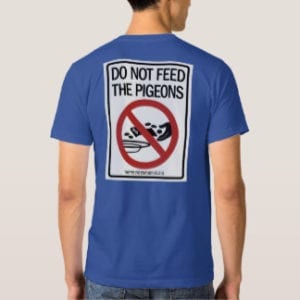
by Pigeon Patrol | Jul 25, 2016 | Animal Deterrent Products, Pigeon Patrol's Services, Pigeons in the News
 People offering grains to feral Common Pigeons (Columba livia) at designated kabutarkhanas or illegitimate feeding places are a common sight these days. It may seem to be a noble deed and is also perceived to be so by many. Hundreds of pigeon-lovers are seen flocking around the grain sellers to purchase the grains to be fed to the pigeons. Mostly such feeding stations are adjacent to places of worship. There are many people who have created mini feeding stations in the balconies, on the window ledges or terraces.
People offering grains to feral Common Pigeons (Columba livia) at designated kabutarkhanas or illegitimate feeding places are a common sight these days. It may seem to be a noble deed and is also perceived to be so by many. Hundreds of pigeon-lovers are seen flocking around the grain sellers to purchase the grains to be fed to the pigeons. Mostly such feeding stations are adjacent to places of worship. There are many people who have created mini feeding stations in the balconies, on the window ledges or terraces.
A large number of people feed pigeons for religious reasons, thinking that by feeding pigeons they are helping the birds and perhaps this helps in washing away their sins. People also believe that feeding pigeons brings prosperity to those who feed them. There are others who feed pigeons thinking that pigeons are hungry, need food and would not survive unless fed by them. Grains are purchased and literally scattered in heaps for the pigeons to feed. Such artificial feeding has led to overpopulation of pigeons that is much beyond the carrying capacity of any place.
AT A GLANCE
The global population estimation of Common Pigeons is c.26,00,00,000 (as per BirdLife International and IUCN).
In one of the citizen science programmes launched to monitor common bird species of India, Common Pigeon topped the list with House Crow following at number two.
It is quite obvious that pigeons are doing very well in cities like Mumbai, thanks to the compassion of many citizens.
Do you wonder what keeps the populations of bird species in the wild balanced, be it a pigeon or an eagle? Food chain, to a great extent, regulates relative abundance of each species based on their reproduction, deaths and predator-prey relationship. In case of feral pigeons, in cities like Mumbai, there is a problem of plenty. In the wild, the Common Pigeon (previously known as the Blue Rock Pigeon) is seen around cliffs and rocky areas, which they prefer for nesting. However, in cities and towns their preference for naturally occurring cliffs has been replaced by parapets, AC compressor units and any such flat surface in city buildings where pigeons seek shelter. Due to the constant availability of food, pigeons have started nesting throughout the year; unlike in the wild where nesting season coincides with the food availability in nature. Predatory birds help in keeping the population of pigeons in control by feeding on them in the wild. But unfortunately urbanisation has practically wiped out the predatory birds from most city limits.
Had it been not for our compassionate feeding, the pigeons would have survived anyway but in lesser numbers, enough to be sustained on the natural food availability in and around the cities. By providing them with ready food, pigeons in cities have lost their natural ability to scavenge and survive on their own. Scavenging for food is an important exercise for wild birds that they must indulge in. Such ‘compassionate’ feeding may attract birds (and also rodents like rats and mice) close to you but may also result in nutritional deficiencies in birds. Let the birds decide what they wish to feed on instead of us deciding what they should feed on!
The population explosion of pigeons in cities and towns is a serious trend that is slated to grow in future as there is no dearth of food offered to them and nesting sites in cities. Lots of pigeons around may make some people happy but doctors and veterinarians have often expressed concerns over this issue and advise refraining from feeding pigeons.
Dr Alice Bacon at Fraser and Fraser Vets Ltd, Dingwall, Scotland.
Many people enjoy feeding and watching wild birds, but are unaware that their actions may inadvertently cause more harm than good; supplementary feeding supports unnaturally large pigeon populations, and this over-crowding can cause disease outbreaks in pigeons, other wild birds and humans.”
Keeping leftover food or other food stuff in the balcony for other species of ‘hungry’ birds should also be reassessed and probably discouraged. Veterinarians warn that such bird feeders may act as a nodal point of disease spread to other species of birds for emerging diseases of infectious nature.
Dr Olga Nicolas of Vallcalent Wildlife Rescue Centre in Spain.
It may have a zoonotic risk like Salmonella, Chlamydia, hemoparasites though hippoboscid flies etc.”
As the faecal matter gets dried up it forms fomites which could travel in air facilitating spread of infection. Symptoms of coughing, rhinitis, arthritis and headache could easily be encountered. People in the vicinity of pigeons and their droppings are at the highest risk of catching infection. Other species of birds are at great risk of mutually getting infected as well and it would make the infection to persist for longer. On the other hand, birds quickly get used to our food, which obviously is not their natural food. Also, birds not feeding naturally might affect the ecological food chain as they may not eat the fruit which only germinates when it passes through that bird’s intestine. Our ignorance in these matters can have serious consequences that we may not be even aware of. Then why should we interfere with their routine of scavenging for food? “The natural balance of wildlife populations is very sensitive, and we must be careful of how our interactions affect them”, says Dr Bacon.
Don’t get discouraged as a bird lover! You certainly have a role to play as there are many ways of helping in the conservation of birds. Misplaced compassion is not conservation and often does not help. Planting, nurturing and protecting plant species that provide shade, perches, nesting places, fruits and flowers for wild birds is a more sustainable and a logical way to help in bird conservation than artificially feeding wild birds. There are several other ways of getting involved in the conservation of birds. But of course, it requires you to move out of the comfort of your homes and venture out into the wilderness.
As long-term measures, getting involved in wildlife conservation agencies in personal capacity as volunteers, supporting the community at the fringe of protected areas and organising nature clubs and awareness trails on bird conservation for students, are options which you could consider to make an impact on overall bird conservation.
We sincerely appeal to the concerned authorities to take note of the potential health hazards and ecological ramifications associated with feral pigeons and take immediate steps to close down the kabutarkhanas and other pigeon feeding stations. The surplus population of feral pigeons will thus move out elsewhere in the quest for food. Use of some anti-fertility drug or some such means to control the population growth among the pigeons without harming them could also be an option to be considered in controlling the growing pigeon populations.
Dr Barbara Vogler from National Reference Centre for Poultry and Rabbit Diseases, University of Zurich, Switzerland.
The problem of city pigeons is well recognised in Switzerland since many years. Most people are aware that they should not feed pigeons and commonly only elderly people still do it and we do have population control programmes in Bern and Zurich.”
Anti-fertility drugs, if given orally as meals, would have to be assessed for their impact on other birds too as consumption by other bird species can’t be totally ruled out. Impact of such anti-fertility drugs would need to be assessed for any possible toxic effects down the food chain too. In the larger interest of pigeons and humans, people from all communities should come together to sensitively address this problem.
Kedar Gore is a biologist and wildlife conservationists by profession for over two decades. Dr. Naveen Pandey is veterinarian with an expertise and experience in rescue and treatment of wildlife species
About Pigeon Patrol:
Pigeon Patrol Products & Services is the leading manufacturer and distributor of bird deterrent (control) products in Canada. Pigeon Patrol products have solved pest bird problems in industrial, commercial, and residential settings since 2000, by using safe and humane bird deterrents with only bird and animal friendly solutions. At Pigeon Patrol, we manufacture and offer a variety of bird deterrents, ranging from Ultra-flex Bird Spikes with UV protection, Bird Netting, 4-S Gel and the best Ultrasonic and audible sound devices on the market today.
Voted Best Canadian wholesaler for Bird Deterrent products four years in a row.
Contact Info: 1- 877– 4– NO-BIRD (www.pigeonpatrol.ca)
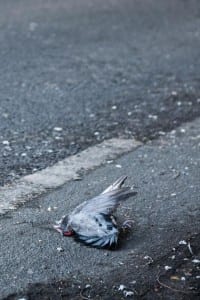
by Pigeon Patrol | Jul 24, 2016 | Pigeon Patrol's Services, Pigeons in the News, UltraSonic Bird Control
 A New Jersey teenager hired to humanely kill birds after a Philadelphia Gun Club pigeon shoot is now facing animal cruelty charges — after the incident in Bensalem, Pa. was captured on video by an animal rights group.
A New Jersey teenager hired to humanely kill birds after a Philadelphia Gun Club pigeon shoot is now facing animal cruelty charges — after the incident in Bensalem, Pa. was captured on video by an animal rights group.
Steve Hindi of Showing Animals Respect and Kindness said one of the group’s investigators was filming the shoot from across the Delaware River as part of its ongoing effort to monitor the Philadelphia Gun Club’s activities.
The two organizations have been involved in litigation and are currently operating under a consent decree that required some concessions from the gun club — including that the gun club make someone available to quickly, humanely euthanize birds after shoots, Hindi said.
In the video, someone in a red hood is seen throwing rocks at the birds, and then flinging and kicking the birds themselves. He appears to be alone and unsupervised. He has been identified in news reports as being from Bridgeton, but police have not released his identity because of his age.
SHARK provided the video to police, but alleges the gun club didn’t cooperate — telling police the club didn’t have anyone in that area during the shoot and didn’t know the individual involved.
“All we can say now is that we can’t identify who the person is, and we’re cooperating with the police investigation,” attorney Sean Corr, representing the gun club, told Philly.com earlier this month. “It appears that he was down range during active shooting, and we don’t station anybody in front of the firing line. That just adds to the mystery.”
Hindi told New Jersey 101.5 his organization then provided police with further footage — showing the person in the red hood coming out of the gun club’s property and associating with its members.
“The Philadelphia Gun Club cooperated with the police and does not believe the individual would have been apprehended without our cooperation,” Corr is quoted telling Philly.com in a newer report. A call to Corr by New Jersey 101.5 has not yet been returned.
Hindi called that an “amazing turnaround.”
“They want credit for having put a kid out there by himself, a minor, torturing animals without supervision, after initially saying they don’t know who he is,” Hindi said.
In the Philly.com report, Bensalem Police Lt. William McVey said pigeon shoots are legal in Pennsylvania (though SHARK disputes that) — “so there’s nothing we can do about that. Our concern is the treatment of the animal once it is shot, to make sure it’s (euthanasia) done as humanely and swiftly as possible. In this case, it crossed the line.”
A call to Bensalem Police has not yet been returned.
About Pigeon Patrol:
Pigeon Patrol Products & Services is the leading manufacturer and distributor of bird deterrent (control) products in Canada. Pigeon Patrol products have solved pest bird problems in industrial, commercial, and residential settings since 2000, by using safe and humane bird deterrents with only bird and animal friendly solutions. At Pigeon Patrol, we manufacture and offer a variety of bird deterrents, ranging from Ultra-flex Bird Spikes with UV protection, Bird Netting, 4-S Gel and the best Ultrasonic and audible sound devices on the market today.
Voted Best Canadian wholesaler for Bird Deterrent products four years in a row.
Contact Info: 1- 877– 4– NO-BIRD (www.pigeonpatrol.ca)

 Humans could become better at switching between tasks – such as shifting from emailing to taking a phone call – if they behaved more like pigeons and stopped thinking about what they are doing, research by psychologists at the University of Exeter suggests.
Humans could become better at switching between tasks – such as shifting from emailing to taking a phone call – if they behaved more like pigeons and stopped thinking about what they are doing, research by psychologists at the University of Exeter suggests.

 Humans could be more efficient if they learnt from pigeons and stopped thinking about what they are doing, according to scientists.
Humans could be more efficient if they learnt from pigeons and stopped thinking about what they are doing, according to scientists.
 A lonely woman who ignored a council order to stop feeding the pigeons in her garden must pay a £640 fine and £1,729 court costs.
A lonely woman who ignored a council order to stop feeding the pigeons in her garden must pay a £640 fine and £1,729 court costs.
 FEEDING the birds costs “tuppence a bag” in the classic film Mary Poppins, but one woman has been fined £640 for putting out food for the pigeons.
FEEDING the birds costs “tuppence a bag” in the classic film Mary Poppins, but one woman has been fined £640 for putting out food for the pigeons.
 People offering grains to feral Common Pigeons (Columba livia) at designated kabutarkhanas or illegitimate feeding places are a common sight these days. It may seem to be a noble deed and is also perceived to be so by many. Hundreds of pigeon-lovers are seen flocking around the grain sellers to purchase the grains to be fed to the pigeons. Mostly such feeding stations are adjacent to places of worship. There are many people who have created mini feeding stations in the balconies, on the window ledges or terraces.
People offering grains to feral Common Pigeons (Columba livia) at designated kabutarkhanas or illegitimate feeding places are a common sight these days. It may seem to be a noble deed and is also perceived to be so by many. Hundreds of pigeon-lovers are seen flocking around the grain sellers to purchase the grains to be fed to the pigeons. Mostly such feeding stations are adjacent to places of worship. There are many people who have created mini feeding stations in the balconies, on the window ledges or terraces.
 A New Jersey teenager hired to humanely kill birds after a Philadelphia Gun Club pigeon shoot is now facing animal cruelty charges — after the incident in Bensalem, Pa. was captured on video by an animal rights group.
A New Jersey teenager hired to humanely kill birds after a Philadelphia Gun Club pigeon shoot is now facing animal cruelty charges — after the incident in Bensalem, Pa. was captured on video by an animal rights group.